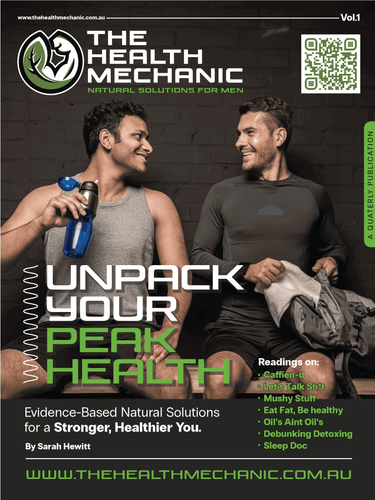Uncover the truth about are eggs good for you. Debunk the myths and real facts about the health benefits of eggs on our blog.
Debunking Myths: Are Eggs Good for You?
Key Takeaways
- Eggs & Cholesterol – The fear of eggs raising cholesterol is based on outdated research. New studies show dietary cholesterol has little impact on blood cholesterol for most people.
- Cholesterol’s Role – Cholesterol is essential for cell membranes, hormone production, vitamin D synthesis, and brain health.
- HDL vs. LDL – LDL is often labeled 'bad cholesterol,' but it's necessary for body function. The real issue is inflammation and oxidative stress.
- List Eggs & Nutrients – Packed with high-quality protein, eggs provide essential amino acids, choline for brain health, and lutein & zeaxanthin for eye protection.
- List Advanced Heart Health Testing – Looking at homocysteine levels, LDL particle size, and lipid absorption can provide a more accurate risk assessment than standard cholesterol tests.
Introduction
For many years, people have debated how eggs affect heart health. I’ve lost count of the times I’ve been asked if eggs are good for you , or how many eggs is too many! The main concern is the cholesterol in eggs. However, our understanding of healthy eating keeps changing as new studies come out.
Recent research shows that dietary cholesterol may not be as harmful as people thought. So, should we views eggs as helpful or harmful for health?!?
The Origin of Egg Myths- Are Eggs Bad For Cholesterol?
The fear comes about eggs and their supposed connection to heart disease comes from old scientific studies. While these studies were important, they
didn’t capture how cholesterol works in the body, or the complex nature of heart disease. As a result, recommendations were simply made to eat less eggs.
This led to lasting myths about the dangers of eggs that continue to cause confusion today.
Historical Perspective on Eggs and Cholesterol
In the latter part of the 20th century, doctors became more aware of associations between high cholesterol levels and the risk of heart disease. This led to a search for food items that play a role, and some types of fat such as saturated fat and dietary cholesterol stood out as major concerns. Eggs, which are rich in cholesterol, came under scrutiny.
Early studies indicated that eating foods high in cholesterol might raise blood cholesterol levels, which is a known risk for heart disease. This connection
encouraged government health groups to create guidelines that recommended people limit their cholesterol intake. As a result of this health information, eggs became to be viewed negatively.
These early guidelines were made with good intentions, but as I mentioned earlier, they were based on a narrow understanding of how cholesterol actually works in the body. We now know that it is much more complex than first thought- many different individual factors can influence the relationship between dietary cholesterol and blood cholesterol levels
Understanding Cholesterol
8.3% of men in Australia have elevated cholesterol. Cholesterol has a bad name, but it actually plays important roles in our bodies.
Cholesterol helps to keep our cell membranes strong. It is also involved in making sex hormones and vitamin D and protecting the health of the neurons (nerves) in our brains!.
It is imporant to understand the different types of cholesterol and their function in our bodies.
Different Types of Cholesterol and Their Roles
Broadly speaking, there are two main types of cholesterol: high-density lipoprotein (HDL) and low-density lipoprotein (LDL). HDL is often called “good cholesterol.” It helps by picking up extra cholesterol from the bloodstream and taking it back to the liver. This is how the liver processes and removes it. Higher HDL levels are usually linked to a lower risk of heart disease. Triglycerides have more to do with refined carbohydrate intake.
On the other hand, LDL is known as “bad cholesterol.” I try to discourage this term, because LDL is vital and has health benefits! Over time, in some people, LDL can build up and create plaque, making the blood vessels narrower. This can lead to a condition called atherosclerosis, which raises the risk of heart attacks and strokes.
it is important to have a healthy ratio of HDL and LDL cholesterol. Lowering LDL cholesterol is important, but increasing HDL levels is also valuable for good cardiovascular health.
The Impact of Dietary Cholesterol vs. Endogenous Production
Dietary cholesterol from food may not affect blood cholesterol levels as much as we used to think. Our bodies use cholesterol, and can adjust how much cholesterol it makes! The cholesterol our own bodies make is called endogenous cholesterol production. And- if we eat more dietary cholesterol, our bodies usually make less to balance it out. Pretty cool, hey!?!
And studies now show that trans fats have a greater impact on raising LDL cholesterol levels compared to standard dietary cholesterol from naturally occurring products like red meat and eggs. Trans fats can be found in processed foods, and unfortunately they are not banned in Australia, so many food items manufactured here still contain these artifically produced fats. It’s better to focus on cutting down trans fats in our diet rather than trying to limit natural
cholesterol intake.
For most people, eating eggs in moderation as part of a balanced diet should not raise blood cholesterol levels significantly, especially if we manage trans fat intake. However, individuals with certain health issues like familial hypercholesterolemia may need to follow stricter dietary rules from their doctors. It’s important to understand why your cholesterol levels are elevated, in order to best manage it. I explain more about why your cholesterol could be elevated here.
Understanding Cholesterol
An important point to note is that eggs are more than just cholesterol. Eggs are packed with important nutrients, and they are a cheap and easy source of high-quality protein, healthy fats, vitamins, and minerals.

The Amino Acid Profile of Eggs
Eggs are a complete protein source. This means they have all nine essential amino acids that our bodies can’t produce. And because our bodies can’t produce them, essential amino acids need to be provided through food. Amino acids are important because they help make up protein, which is key for a multitude of functions in the human body.
Also, the protein in eggs helps you feel full! This can aid in weight management, because keeping your appetite in check can lower overall calorie intake. In fact, studies show that the consumption of eggs at breakfast can lead to fewer calories consumed at lunch, in comparison to cereal breakfasts! This suggests that adding eggs to meals and snacks can help control cravings and support weight loss goals.
Key Nutrients in Eggs: Choline, Lutein, and Zeaxanthin
Choline, which is particularly concentrated in egg yolks, plays a crucial role in brain development, memory, and nerve function. It is also involved in the transportation of fats and cholesterol in the body, further contributing to overall metabolic health.
Eggs are also a rich source of lutein and zeaxanthin, which are potent antioxidants that accumulate in the retina of the eye. These compounds protect our eyes from harmful blue light and oxidative stress, reducing the risk of age-related macular degeneration and cataracts, leading causes of vision loss.
Including eggs as part of a balanced diet can help ensure adequate intake of these crucial nutrients, contributing to overall health and well-being.
Beyond Diet: How to Reduce Cholesterol Naturally
A nutritious diet is very important for heart health. However, it is just one part of a bigger picture. Many other factors, including environmental and biological, can affect your cardiovascular health as well. Genetics, lifestyle habits, stress, and sleep quality all influence heart well-being. It is vital to look at all these factors together.

The Role of Oxidative Stress and Inflammation
Oxidative stress happens when the body makes too many free radicals. Free radicals are unstable molecules that can harm cells and DNA. If the body cannot neutralize them with antioxidants, it creates an imbalance. This imbalance can cause inflammation, which is the body’s natural immune response to an excess of free radicals.
Long-term inflammation can harm the lining of blood vessels. Oxidation and inflammation promotes plaque formation of cholesterol in your arteries. These
fatty deposits become atherosclerotic plaques or atherosclerosis.
To keep our hearts healthy, we need to lower oxidative stress and inflammation, not just reduce cholesterol. Diets high in fruits, vegetables, and whole grains are high in antioxidants. It is also important to manage stress with activities such as meditation or yoga. Research shows that both meditation and yoga can reduce inflammatory markers.
Understanding Intestinal Hyper-absorption of Lipids
Some people have trouble regulating their cholesterol levels. They may absorb more dietary cholesterol in their intestines than other people do. This can result in high blood cholesterol levels, even if they only eat a moderate amount of cholesterol.
Genetics, gut health, and diet can all affect how much cholesterol is absorbed. Diets that are low in fibre and high in saturated fat can raise cholesterol absorption. On the other hand, a diet with a lot of fibre can help remove cholesterol from the body, which reduces blood cholesterol levels.
If you are worried about your cholesterol, consider talking to a functional medicine practitioner or nutritionist about advanced lipid testing. These tests can show how cholesterol is absorbed. They can also help create a plan for your diet and lifestyle to improve your heart health.
The Importance of Microcirculation
It is important to look at heart health as a whole, not just cholesterol levels. This means considering microcirculation and the health of blood vessels. Microcirculation is made up of smaller blood vessel called capillaries, which branch off from arteries. These capillaries deliver the oxygen and nutrients found in blood to our tissues and organs.
The health of our capillaries and microcirculation is a key part of good cardiovascular health. If microcirculation is damaged, it impacts the amount of nutrients and blood that reaches our extremeties, and also puts more presure on the heart. This imparied circulation raises the risk of problems like heart attacks and other heart-related events.
Several things can hurt microcirculation and the health of blood vessels, not just elevated cholesterol. Smoking, high blood pressure, diabetes, and long- term inflammation are some factors. You can read more about peripheral vascular disease in my article here. It is essential to take a complete view of heart health, dealing with these risks through lifestyle changes, physical activity, managing stress, and having regular checkups.

Advanced Testing for Heart Health
Standard lipid panels give good information about total cholesterol, HDL, and LDL levels. But advanced tests can help us understand cardiovascular risk better. These tests look deeper into how your body responds to cholesterol.
By checking markers like homocysteine levels, LDL particle size and number, and lipoprotein(a), we can tailor your treatment for better results and reduced risk of heart disease.
Beyond LDL: The Significance of Homocysteine Levels
Homocysteine is an amino acid found in the blood. It is made when the body breaks down protein. Elevated plasma homocysteine is associated with an increased risk of heart disease. This can happen even if your LDL cholesterol levels are normal.
When homocysteine levels are high, it can damage the lining of your arteries and predispose you to atherosclerosis and the risk of blood clots.
Some common causes of high homocysteine levels are genetics, lack of certain nutrients (especially folate, vitamin B6, and vitamin B12), and health issues like kidney disease. Taking steps to lower homocysteine levels can improve heart health.
Assessing LDL Particle Size and Number
Although LDL cholesterol is the number that everyone focuses on these days, looking at the size and number of LDL particles can provide us with much deeper insights into heart disease risk. LDL particles can be small, dense particles or large, buoyant ones.
Research shows that smaller, denser LDL particles are more likely to enter artery walls. This can lead to plaque buildup and increase the risk of heart disease. People who have many small, dense LDL particles face a higher heart disease risk- even if your overall LDL cholesterol levels are normal. Testing for LDL-P gives us a clearer picture of your risk of heart disease. In contrast, larger LDL particles are less likely to adhere to the artery walls.
The Relevance of Lipoprotein(a) in Dietary Decisions
Testing for lipoprotein(a), or Lp(a), measures the levels of a specific type of lipoprotein in the blood that is genetically determined and independent of traditional cholesterol levels. Elevated Lp(a) is associated with an increased risk of atherosclerosis, heart attacks, and strokes, as Lp(a) can promote blood clot formation and plaque buildup in the arteries.
Unlike LDL, Lp(a) levels do not typically respond to lifestyle changes or conventional lipid-lowering therapies, making its measurement particularly important for identifying individuals at elevated cardiovascular risk who may not show abnormalities in other lipid tests. Therefore, testing for Lp(a) can be as valuable as other lipid tests because it provides additional insight into a person’s unique risk profile, particularly for those with a family history of cardiovascular disease or unexplained heart conditions.
In these situations, the cholesterol in eggs may need to be considered and intake monitored.

TMAO, Eggs, and Heart Disease Risk
In recent years, people have paid a lot of attention to the link between TMAO (trimethylamine N-oxide) and heart disease risk. TMAO is a compound made by gut bacteria when they metabolise choline. Some research shows that eating eggs may raise TMAO levels, which has led to more discussions about how eating eggs affects the heart.
However, it is important to view these results carefully. Seafood also increases TMAO levels- in fact, halibut generated over 53 times as much TMAO as eggs! But seafood hasn’t earnt the same bad reputation that eggs have!
Still, the link between egg intake, TMAO levels, and heart disease risk is complicated. Other factors also play a role. These include differences in gut bacteria, genetics, the marekers we mentioned above, and the overall quality of a person’s diet. More thorough research is needed to prove these connections and understand how egg intake fits into this complex situation.
Conclusion
In conclusion, the common myths about eggs and health are predominantly false. Eggs are full of amazing nutrients. They contain important amino acids and nutrients like choline, lutein, and zeaxanthin. It’s important to understand your individual risk factors and what affects heart health, rather than focus solely on lowering dietary cholesterol. Advanced tests can give more details than regular cholesterol tests for a complete view of your health, in order to make your dietary decision making better. For more tailored advice on a heart-healthy diet, talk to a functional medicine practitioner or naturopath who can help debunk the egg myth further for you and your individual factors.
Frequently Asked Questions
How do eggs influence cholesterol levels?
Dietary cholesterol from eggs does not significantly affect blood cholesterol levels in most healthy people. Our bodies manage cholesterol production well. When we eat more dietary cholesterol, our bodies often make less on their own. Eating less cholesterol to lower cholesterol is not usually the best way forward!
Are eggs good for you?
Daily eating of eggs can be part of a healthy diet because they have many nutrients. Eggs are high in protein. This helps you feel full and supports weight control. Still, it’s important to think about your own health, food choices, and ask a healthcare expert for advice. The Heart Foundation also recommends you choose healthy fat options which include nuts, seeds, avocados, olives and their oil for cooking. The Mediterranean Diet is a good source of these fats.
How many eggs per week is considered healthy?
The heart foundation no longer sets a strict limit on the number of eggs people can eat. Still, dietary guidelines recommend eating eggs in moderation. This is a safe level which fits well with a balanced diet.












